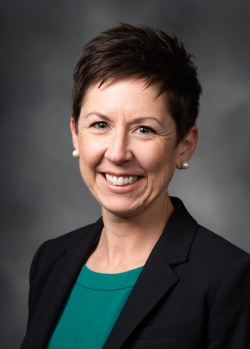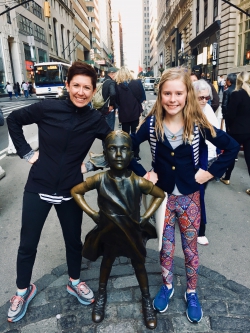Families That Play Together, Stay Together
PROVO, Utah – Feb 03, 2020 – For BYU Marriott experience design and management assistant professor Sarah Agate, the common phrase “a family that plays together, stays together” couldn’t be more true. Throughout her career and in her personal life, Agate has been committed to teach people how important creating inclusive experiences are for strengthening family relationships.
After graduating from BYU with her bachelor’s degree in family studies in 2001, Agate tackled her master’s degree in youth and family recreation at BYU while spending her summers working at a Boy Scouts camp in Florida. It was while organizing and planning Boy Scouts activities that Agate fell in love with the idea of creating experiences. After receiving her master’s degree in 2005, Agate went on to receive her PhD in parks, recreation, and tourism management at Clemson University in 2010. Following graduation, she worked as a professor in Illinois and New York before coming to BYU Marriott for the start of the Fall 2019 semester.
Agate’s early research focused on developing family relationships in family vacation settings. “Families go on vacation, and it's not always fun. You often have teenagers glued to their phones, small kids getting dragged along and complaining, and stressed parents,” says Agate. “I wanted to look at how to create an experience that's enjoyable for all family members.”
A lot of Agate’s research insights come from watching her own family and seeing how they engage with each other. “My family is like my own dedicated research lab,” says Agate. When Agate’s family decided to go to New York for a family vacation several years ago, Agate wanted to make sure her children enjoyed the experience. Her son, Leo, who was seven at the time, had a stutter. His speech therapist recommended that as a family, they slow down in their everyday lives. Agate kept that in mind when planning the vacation.
Rather than attempting to squeeze in every attraction, Agate decided to slow down everyone’s pace, see one big attraction a day, and be more intentional about how the family’s time was structured. The family strolled around Central Park and toured the United Nations building—making both Leo and Agate happy. “New York can be overwhelming, but Leo loved our trip,” says Agate. “It was a matter of helping him engage in a way that worked for him.”
As Agate researched family relationships, she decided to focus more on the roles of mothers and women in creating positive family environments and experiences. Her current research focuses on women’s empowerment and how organizations are helping to facilitate empowerment through experiences.
Agate looks to organizations such as Girls on the Run and 261 Fearless as leaders in the women’s experience design space. The two organizations focus on teaching girls and women how to run and be healthy, as well as how to increase self-confidence and compassion for others. “My team of other faculty members and undergrad research assistants and I are looking at how groups like these are creating experiences for girls and women, and how other organizations can create those positive experiences in other settings,” says Agate.
Through Agate’s research, she’s discovered how important discussions about societal pressures surrounding mothers are to women. According to Agate’s research and personal experiences, mothers have an unspoken pressure to be perfect in the home and around other parents. “Women have higher levels of stress, depression, heart disease, anxiety—society puts immense pressure on women to be perfect,” says Agate. “My research focuses on what we can do to help women feel strong and enjoy building family relations rather than struggling and just trying to survive.”
Whenever Agate conduced group research sessions throughout her career, she observed an interesting phenomenon. What started out as a way to get data for Agate’s research became almost a group therapy session for the participants. Feeling a sense of safety within the group, the mothers opened up about difficulties they face in their attempts to be the “perfect” mother. “One mom told me, ‘I feel so much better knowing I'm not the only one having this experience,’” says Agate. “My research helps to explore those pressing questions, engage in discussions that are a bit taboo, and help women become more empowered.” Agate wants women to open up, be vulnerable, and have discussions that will help mothers feel less alone.
Agate hopes women come to understand there is no such thing as the perfect mother or the perfect family—just people working together to be the best they can be. “People think that if you love each other enough then everything will be fine and easy. But relationships are not easy—they take work and compromise,” says Agate. “Find out what works for your family, and remember, ‘Not everything is going to work perfectly, but we'll work through everything together.’”
Media Contact: Chad Little (801) 422-1512
Writer: Natasha Ramirez





